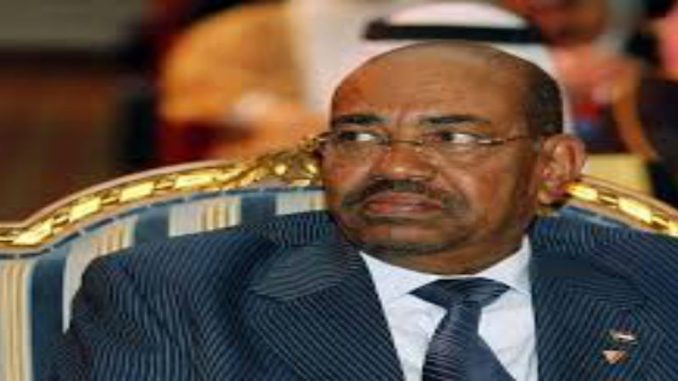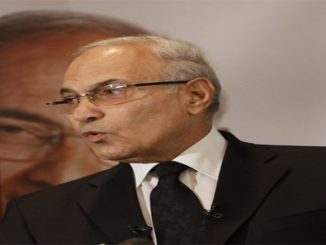
Sudanese President Omar al-Bashir has accused the Egyptian intelligence of supporting Sudan’s opposition forces, and he promised to take Hala’b and Shalateen border dispute between the two neighbors to the United Nations Security Council if negotiations failed.
Al-Bashir’s comments came in an extensive interview on Sunday with the Saudi-owned Al-Arabiya TV network.
Al-Bashir: Hala’b and Shalateen dispute will be taken to the United Nations
During the T.V interview, President Omar al-Bashir mentioned that Sudan will resort to the United Nations Security Council if Egypt refuses to negotiate over the Hala’b triangle.
He said, “The Hala’b triangle is Sudanese, ”adding that Hala’b was one of the Sudanese districts that took part in the first elections held under the joint Egyptian-British governance.” He added,”Elections are a major sovereign practice.”
Last month, Sudan renewed its complaint against Egypt in the UN Security Council to reconsider the borders between both countries, referring to Halai’b and Shalateen area, according to a Sudanese diplomatic source.
In fact, al-Khartoum has called Cairo for direct negotiations regarding Halai’b and Shalateen case similar to what has been implemented with Saudi Arabia regarding Tiran and Sanafir islands that the Egyptian government has announced that they belong to Saudi Arabia last April during King Salman’s visit to Egypt.
In addition, the diplomatic source, who preferred to remain anonymous, added,”The permanent mission of Sudan at the United Nations has been contacted on January 5,2017 to keep Sudan’s complaint at the Security Council under consideration which was submitted on 20-2-1958 over the Egyptian borders.”
It is noteworthy that Sudan has called more than once in an official way to restore back its right over Halai’b and Shalateen.
The Hala’ib triangle, which is a 20,580-km area on the Red Sea, has been a disputable issue between Egypt and Sudan since 1958, shortly after Sudan gained its independence from the British-Egyptian rule in January 1956.
Since the mid-1990’s, the area has been under Cairo’s full military control.
Last April, Cairo refused a demand by the Sudanese government to hold direct negotiations on Hala’ib and Shalateen or to accept the referral of the dispute to the International Court of Arbitration.
Egypt has used to reject Sudan’s repeated calls for referring the dispute to international arbitration.
The international law stipulates that the agreement of the two parties is needed to arbitrate a dispute by the tribunal.
Moreover, the Egyptian authorities have imposed restrictions on the entry of Sudanese nationals into the area.
Al- Bashir Accused the Egyptian Intelligence of Supporting Sudanese Opposition
Regarding al-Sisi,al-Bashir said,“The problem is not with al-Sisi but with the regime as there are Sudanese opposition figures that the Egyptian intelligence supports,”he added, indicating that in every bilateral meeting Khartoum is pushing for Cairo to stop supporting the opposition.
Talks about a tripartite alliance between Cairo, Juba, and Uganda to siege Ethiopia and Sudan have circulated through the media during South Sudan’s visit to Egypt in January 2017.
During Salva Kiir’s visit to Cairo, an Egyptian newspaper al-Dostour published an article titled: “In Cooperation between Cairo, Juba, and Uganda… Egypt leads a tripartite alliance to siege Ethiopia.”
The Egyptian newspaper mentioned that Egypt seeks to enhance its movements in Africa and especially with the Nile basin countries.
It also reported that Egypt, Juba, and Uganda currently form a tripartite alliance its main target to siege Ethiopia, support Egypt’s interests in the region and put pressure on Addis Ababa’s government if necessary.
Moreover, one of Egypt’s top priority to enhance its influence in Sudan to put pressure on Omar Hassan al-Bashir’s regime if the situation escalated especially that al-Bashir’s policy toward Egypt is changeable and unstable.
In addition, al-Bashir backs Ethiopia against Egypt, according to al-Dostour newspaper.
In the same context, Sudan Tribune (an electronic news portal on Sudan and South Sudan) said, “The three leaders agreed to open training camps for Sudanese armed opposition at Uganda-South Sudan border with the view to toppling the Sudanese government for supporting the construction of a dam by Ethiopian government on River Nile.”
“This deal, according to security sources, resulted in dispatching more than big trucks full of Ugandan troops heading to South Sudan,” according to Sudan Tribune.
It added that unconfirmed reports claimed that 20 trucks entered Nimule through Elgu, and eighteen trucks via Ajdumani to Kajokej.”
A source told Sudan Tribune that the mission is to chase the armed opposition figures and to clear out rebellion around South Sudan border with Uganda and the Democratic Republic of Congo, though the Uganda government blackmail the people in the region that they are pursuing Uganda Armed oppositions in Northern Uganda, Eastern Uganda and West Nile as a mere political propaganda.
Sudan Tribune also pointed out to the of al- Sisi’s visit to Uganda last month followed by unofficial visit of president Museveni to Juba three days after Egypt President visited Uganda,” in which President Museveni during a closed-door meeting with President Silva Kiir, conveyed the message that he and Egyptian leader to open up a training camp at border with his country.”
According to the Sudanese news site, both Kampala and Juba meetings concluded to provide support to the Sudanese and Ethiopian Armed oppositions which will involve training and providing weapons to SPLM-North, Darfur Rebels both with Military Equipment and full logistics including Finance. “Egypt will supply Uganda then South Sudan will be the corridors to supply the equipment to the SPLM-North, Darfur Rebels, and Ethiopian Armed opposition.”
According to media reports, these military training camps will be opened along South Sudan border with Uganda and Congo border. The main aim behind that “to use Congo Central Africa corridors to launch attacks on Sudanese government than using South Sudan Border. The training Camps will be around Mofok and around Lasu,” said Sudan Tribune.
A security source, who preferred to remain anonymous, said that this will be making it o easier for transportation of the Equipment by land because by air it will be difficult because South Sudan air-space is under the control of Sudan.
The source further alleged that the Egyptian government had sent 58 senior military commanders to South Sudan through Uganda to access the ground for training for SPLA, Sudanese and Ethiopian rebels.
He also added that the commanders are from different military units, armor, artillery, air-defense and central military intelligence.
Last August, Sudan Tribune cited military sources saying that South Sudanese recruits largely drawn by the ethnic group of President Salva Kiir and his army chief of general staff, Paul Malong Awan, have been trained by foreign instructors from Egypt and neighboring Uganda to perform airborne landing to seize an enemy’s airfield and retain it until the arrival of the main forces.
Will Khartoum’s Fears and Saudi Tensions with Cairo bring Both Countries Closer?
Signs of a bilateral cooperation between Saudi Arabia and Sudan was reported recently which probably raised doubts and speculations on the Egyptian side.
In fact, Sudan inaugurated Upper Atbara and Setit Dams complex which will pave the road to launching a Saudi cultivation project which was legally approved by the Sudanese parliament in mid-2016.
The Saudi project will allow the Kingdom to cultivate and reclaim one million acres in the area of Atbara and Setit dams.
It worth to mention that Sudan inaugurated its mega electricity project of Upper Atbara and Setit Dams complex, east Sudan, which is considered the largest project in the country to generate hydroelectric power with 320 megawatts, expected to increase to 2000 megawatts by the end of 2017.
In this context, a Saudi delegation from the Kingdom’s ministry of agriculture and participating companies visited Sudan recently to participate in the inauguration of Atbara and Setit Dams.
Moreover, Sudan’s Minister of Water Resources and Irrigation Moataz Mousa has announced that his country will sign several contracts and agreements with Saudi Arabia in the coming period, as an essential step to launch the Saudi project of cultivating and reclaiming millions of acres granted by Sudan to Riyadh in the light of cooperation between the two countries.
On the other hand, many Saudi companies have submitted several requests to the Sudanese government to implement various projects in all types of investments.
The most recent was a joint Saudi-Chinese company which began the agricultural investment’s procedures at Sanar wilayat (state), east Sudan, in an area of 90,000 acres which lies in Suki agricultural project.
Moreover, a business delegation from Soliman al-Garhy (Saudi) Group, the owner of Atbara Cement Company, negotiated with the government of Kassala state the establishment of a cement company at Maman area, a Telkuk locality.
In addition, Al-Qahtani Investment Saudi Company signed an agreement with Sudanese Ministry of Oil and Gas in the beginning of this month, to enter new projects to exploit and develop natural gas associated with oil that is produced by the Saudi group in western Darfur region.
Last July, the Sudanese Parliament approved a law that allows Saudis to cultivate and reconstruct millions of acres in northern and eastern Sudan.
Saudi Arabia will pour about $10 billion in the first phase for infrastructures that will take around 10 years. Then, the Kingdom will start to reclaim and irrigate agricultural land from Atbara and Setit Dams.
In addition, under the agreement signed by the Saudi Ministry of Agriculture in Khartoum last July, as part of its “Vision 2030”, Saudi Arabia will be granted the right to exploit water freely to irrigate million acre based on the crop combination recommended by the project studies and a long period of time that will last for 99 years for the optimal exploitation of these vast areas.
Accordingly, the Kingdom will link its food security with Sudan especially that the latter has about 200 million acres suitable for agriculture but it takes advantage of only 30 million of them.
There is no doubt that the recent rapprochement between Saudi Arabia and Sudan can be interpreted within the context of the continuous tensions between Riyadh and Cairo from one side, and al-Khartoum’s national security fears from Cairo from the other side.
The relations between Egypt and Saudi Arabia have strained after Egypt voted on the Russian-backed draft resolution in the United Nations security council. Egypt’s vote on October 8 to support a Russian Security Council resolution on Aleppo has exposed an unprecedented rift between Egypt and its strongest Arab ally, Saudi Arabia.
The vote triggered the first public condemnation by the Saudis of the Egyptian regime, which they helped bring to power three years ago.
The Saudi criticism also coincided with cutting monthly discounted oil shipments to Egypt, a much-needed support for the country’s deteriorating economy.
Since then a cold war has erupted between both countries. Each country seeks to take steps against its counterpart especially in Africa.
On one side, Egypt sought to impede building a Saudi military base in Djibouti while informed media sources said that Ahmed Al-Khatib, the adviser of Saudi King Salman bin Abdul-Aziz, has paid a visit to the Ethiopian Renaissance Dam last December within the framework of his current presence in the Ethiopian capital, Addis Ababa, to find out the possibility of renewable energy generation.
The Ethiopian source, that accompanied the Saudi official to the dam, said that Al-Khatib visited the dam , and was received by the project manager Semegnew Bekele.
In the same context, Saudi Minister of Agriculture Abdulrahman bin Abdulmohsen al-Fadhli has also visited Ethiopia before Al-Khatib’s visit.
Egypt was alarmed by the visit as it is sensitive towards the Renaissance Dam issue as it fears that it will have negative repercussions on its water shrews from the Nile River.



